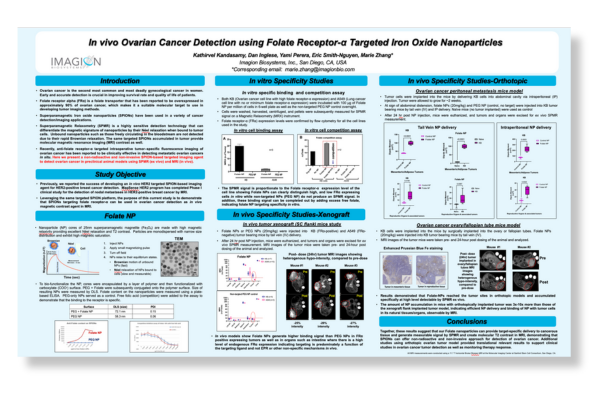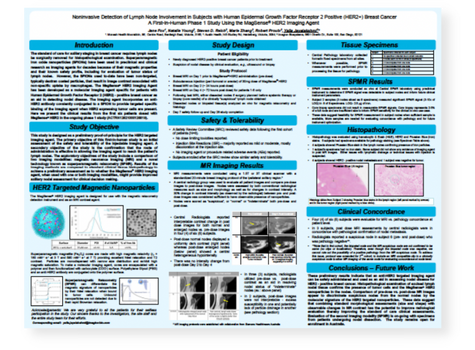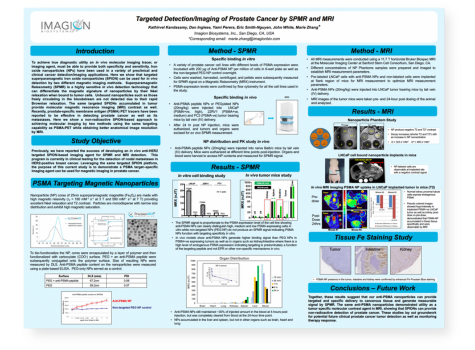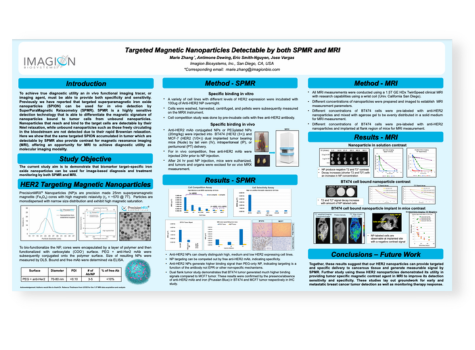Our latest presented poster
.png)
San Antonio Breast Cancer Symposium | December 2023
MagSense® HER2 Imaging Agent: Molecular MRI for the Detection of Axillary Nodal Metastasis in Subjects with HER2+ Breast Cancer
On a comparison of post-MSH2IA imaging data with pathology, 7 out of the 8 patients with suspicious nodes were also positive by pathology. Based on these comparisons between SoC Axillary Ultrasound (AxUS) imaging and pre-dose imaging along with patient-level concordance with pathology, there is enough data to qualitatively conclude that MSH2IA aids in the identification of axillary lymph nodes and the discrimination of tumor-containing lymph nodes from normal lymph nodes, without any safety concerns for the patients.
Previously presented posters

AACR: Speciality Conference - Ovarian Cancer | Oct 2023
In Vivo Ovarian Cancer Detection Using Folate Receptor-α Targeted Iron Oxide Nanoparticles
Data presented at this meeting is a continuation of the work we presented at the AACR annual meeting earlier this year (April 2023). This additional data enabled us to complete all the proof-of-concept studies of the MagSense folate nanoparticles for ovarian cancer detection and paved the way to advance the program to future IND-enabling studies, ultimately to support a Phase I clinical trial.
.png?width=475&height=350&name=AACR%202023_3586%20poster%20thumb_475x350%20(1).png)
American Association of Cancer Research Meeting | Apr 2023
In Vivo Targeted Detection and Imaging of Ovarian Cancer by SPMR and MRI Using Anti-Folate Receptor Functionalized Iron Oxide Nanoparticles
In this work, Imagion has shown that an anti-folate receptor ligand can be used to specifically target ovarian cancer cells for non-invasive imaging. The folate receptor targeted nanoparticles showed strong specificity in both in vitro and in vivo models, accumulating in implanted tumors preferentially compared to non-targeted controls.
Additionally, the particles accumulated in tissues such as the intestine and kidneys, which endogenously express the receptor, providing further evidence of specificity. The in vivo imaging data suggest the folate receptor nanoparticles could result in the detection of clinically relevant ovarian cancer tumors.
.png?width=512&height=350&name=AACR%202023_3590%20poster%20thumb_475x350%20(3).png)
American Association of Cancer Research | Apr 2023
Targeted Detection of Ovarian Cancer Using Functionalized Iron Oxide Nanoparticles
In this work, Imagion has shown that multiple antibodies targeting various antigens expressed in ovarian cancer could serve as targeting ligands for the detection of ovarian cancer. Two different antibodies were successfully conjugated to magnetic nanoparticles and demonstrated specificity for the target antigen. These results support that Imagion’s magnetic nanoparticle technology is a robust platform for developing targeted imaging agents.

San Antonio Breast Cancer Symposium | Dec 2022
Noninvasive Detection of Lymph Node Involvement in Subjects with Human Epidermal Growth Factor Receptor 2 Positive (HER2+) Breast Cancer - A First-In-Human Phase 1 Study Using the MagSense® HER2 Imaging Agent
Imagion Biosystems presented interim data from our Phase I study for our MagSense® HER2 breast cancer imaging agent at the leading, international 2022 San Antonio Breast Cancer Symposium on December 7th.
In the presentation, we report interim results of the exploratory endpoints related to detection efficacy.
The results indicate that Magnetic Resonance Imaging (MRI) detection of the MagSense imaging agent could help discriminate between suspicious, potentially cancerous nodes from normal nodes, thus tracking nodal metastisis.
In addition, when combined with standard morphological assessments, the imaging agent “has the potential to improve radiological evaluation thereby improving the standard of care clinical assessments.”
Several important findings have emerged from the interim results to date:
- Changes in MR contrast created by the specific binding of MagSense imaging agent to tumor cells aid in resolving nodal status
- No safety, toxicity or adverse events reported related to the imaging agent
This study was our first proof-of-principle in the clinical setting that our targeted nanoparticle technology has the potential to improve on conventional medical imaging methods.
The work was presented by Yalia Jayalakshmi, Ph.D, Chief Development Officer at Imagion Biosystems and co-authored by study principal investigators.

World Molecular Imaging Conference | Sept 2022
Targeted Detection/Imaging of Prostate Cancer by SPMR and MRI
The work was presented by Dr. Marie Zhang, VP of Research and Pre-Clinical Development at Imagion Biosystems.
The preclinical results presented provide strong evidence that our magnetic nanoparticle technology can be used to target prostate cancer tumors expressing the Prostate Specific Membrane Antigen (PSMA) with high specificity.
A molecular imaging agent based on magnetic imaging rather than the use of radioactivity will address the large unmet need of making non-invasive detection of prostate cancer more accessible and affordable and could reduce the need for prostate biopsies for many men, saving costs and improving patient care.

World Molecular Imaging Conference | Sept 2019
Targeted Magnetic Nanoparticles Detectable by both SPMR and MRI
The work was presented by Dr. Marie Zhang, VP of Research and Pre-Clinical Development at Imagion Biosystems.
This study is the Company’s first reported results demonstrating that the anti-HER2 nanoparticles used in Imagion’s Magsense™ technology, which provide specific targeting of cancerous cells, may also have potential as an MR imaging contrast agent.
The study shows MagSense nanoparticles may be equally effective as a multi-modal molecular imaging agint, generating detectable signals in two different imaging methods — superparamagnetic relaxometry (SPMR) and magnetic resonance imaging (MRI).
.png)
American Association Cancer Research Meeting | Apr 2019
HER2 Functionalized Nanoparticles Are Safe and Specific for in vivo HER2+ Breast Tumor Cell Detection
The poster presented by Marie Zhang, PhD, Vice President of Research and Clinical Development at Imagion Biosystems, includes data from development and pre-clinical functionality studies of anti-HER2 antibody-conjugated nanoparticles for in vitro and ex vivo detection of HER2+ breast cancer tumor cells by magnetic relaxometry (MRX).
The data suggest that Imagion Biosystems’ anti-HER2 antibody-conjugated nanoparticles are safe, provide targeted and specific delivery to cancerous tissue in vivo, and generate measurable signals on the magnetic relaxometry detection instrument.

Interested in learning more?
Browse our technology
We are focused on transforming cancer care using our proprietary nanoparticle technology, which allows for better specificity and sensitivity without exposure to radiation. Learn more about the possibilities.
